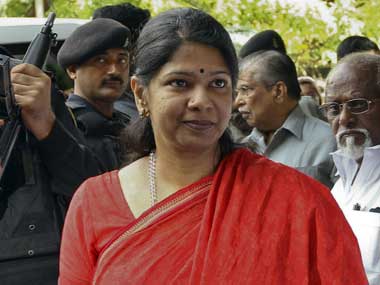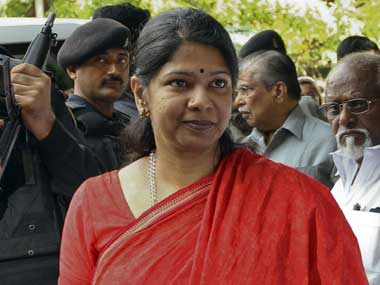By Shiv Visvanathan Recently, I bumped into a friend, an anthropologist, who hates cricket. “Cricket” he sniffed disdainfully, “is still a cheap soap opera, a spectacle. It has not yet arrived because it is not yet an enactment of myth like Bollywood or Indian Politics.” And nowhere is that truism more apparent than in the political soap opera unfolding down South. “The Kanimozhi drama is sheer myth,” my friend contends. The Kanimozhi story is a Bollywood dream, scripted by a Tamil writer. [caption id=“attachment_8843” align=“alignleft” width=“380” caption=“Rajya Sabha member Kanimozhi is in the middle of a storm due to the 2G scam. Babu Babu/Reuters”]
 [/caption] Even the names of her half brothers Stalin and Alagiri sound like Mafia dons. Kanimozhi has a touch of a tainted Cinderella with her brothers playing the structural equivalent of the ugly sisters. It is the possibilities of the plot one must emphasize. It is a bouquet of corruptions, an improbable story where an entire government, a great political party is hypothecated to one family, not the Gandhis but the sprawling clan of Mr. Karunanudhi. The cast of people is immense, the characters cameo, the twists and turns full of predictable surprises. Kanimozhi, in real life,
battling
her brothers, is a role tailor-made for Jayalalitha. It has the cinematic power that she would have brought alive, recreating the mix of coquettry, loyalty and ambition that marks such politics of family. Here politics is creating a theatre which Bollywood will one day immortalize. As my friend points out, politics surpasses Bollywood as soap opera. Look at the secondary caste of characters it creates. Its bountiful corruption creates a cornucopia of characters, a yellow page of evil and hypocrisy, mixing happily like boy scouts. The Kanimozhi story is epic, legend and popular culture. Look at the layers of corruption it reveals. First consider the three “brothers”: Alagiri represents raw physical power, the bully; Stalin the boss or the logic of politics; the Marans become bagmen converting the colors of currency. Karunanidhi is the politician showing that democracy circulates corruption. He suggest that what upper castes did, and now Dalits are entitled to. Corruption is also India’s way of the perpetuation of the family by any means, of blending family and state. Politics and Bollywood as myths only explore its contradictions. Corruption as ritual drama In the realm of power, Bollywood and politics mediate between corruption and democracy. The logic of corruption in politics and film is classically the same- the battle between family and rule of law, fairness versus nepotism. Both realms show that two are intimately tied through the idea of the double. The double is the opposite that completes the whole, the other without which the self is never complete. In the movies, it is not the sacrificial quality of the mother that is important. It is the sacramental unity of the symbolic brothers: rustic and townsmen, cop and criminal, law and sentiment, desire and duty that is critical. The double shows that the world is never Manichean but hybrid, mixed up and contradictory, even confused. The family, India’s great residue of values, is replete with contradictions embodied as a fight between siblings, genders or generations. Corruption plays out the myth of the double. Bollywood elaborates the myth and politics as history imitates it. Think of Sanjay and Rajiv, the good and bad Indira Gandhi, or Pramod Mahajan vs Pravin Mahajan. Either as splits or doubles, good and evil play out possibilities within the unity of family. What Bollywood exaggerates as the code of possibilities, politics plays out in fact. Sirens of a new politics “She [Kanimozhi] and Niira Radia become such perfect foils. One created within the Karunanidhi corpus of families; the other a diasporic climber; one confident enough to instruct Ratan Tata, the other coy, about power,” says my friend. Unlike the canny self-promoter, Radia, Kanimozhi is loyal to her father yet about to be publicly abandoned by him. She is a tragic figure, a sacrifice. Kanimozhi and Radia go beyond vamp and housewife, outlining a license of a different kind, temptations for desire, power and money. What makes the Kanimozhi-Raja-Radia saga brilliant is its sense of desire. Alagiri and Raja (
according to Radia
) desire Kanimozhi at a distance and yet detest her. Radia desires power more than sexuality. She brings eroticism to power and creates in the fixer, in the middleman, that sense of genius, the catalyst who changes all but remains a background creature. My cricket hating friend pauses and predicts that next time the media votes for the women of the year, the vote will go to Neera Radia and Kanimozhi. They are more than sacrificial pawns. They represent the new orders of power and desire. The plot shows that the line between a Ratan Tata and
Shahid Balwa
is slim, a mere question of genealogy and table manners. As crime goes global, these forms of corruption become combinatory and synergetic. Whether it is Tata, Radia, Alagiri or Kanimozhi, they are also persona reflecting India’s fantasies and dreams. Corruption continually reinvents itself. Democracy as folk culture Popular culture goes beyond Freud or Marx and academic ideas of id and class. It realizes that democracy is a part of folk culture, while governance is a technical idea whose time has not come. “The arrogance of policy is that it sees itself as a science, a managerial formula. Worse it sees popular culture as kitsch. Policy is pious. It is an imagined science. Popular culture suspends judgment to read plot. Read the Radia-Kanimozhi tapes through the eyes of popular culture,” says my friend. Popular culture wallows in the poetics of nepotism. It may lack the political correctness of policy but it understands the logic of crime, temptation and the way sin, crime and illness combine in our society. He concludes, “World Bank codes have no such generosity. They can understand RTI but not the grammar of corruption. That only politics and the dialects of Bollywood can. This is why the DMK should win. Kanimozhi is new cinema and new politics which Jayalalitha will find hard to beat." Shiv Visvanathan is a social science nomad.
[/caption] Even the names of her half brothers Stalin and Alagiri sound like Mafia dons. Kanimozhi has a touch of a tainted Cinderella with her brothers playing the structural equivalent of the ugly sisters. It is the possibilities of the plot one must emphasize. It is a bouquet of corruptions, an improbable story where an entire government, a great political party is hypothecated to one family, not the Gandhis but the sprawling clan of Mr. Karunanudhi. The cast of people is immense, the characters cameo, the twists and turns full of predictable surprises. Kanimozhi, in real life,
battling
her brothers, is a role tailor-made for Jayalalitha. It has the cinematic power that she would have brought alive, recreating the mix of coquettry, loyalty and ambition that marks such politics of family. Here politics is creating a theatre which Bollywood will one day immortalize. As my friend points out, politics surpasses Bollywood as soap opera. Look at the secondary caste of characters it creates. Its bountiful corruption creates a cornucopia of characters, a yellow page of evil and hypocrisy, mixing happily like boy scouts. The Kanimozhi story is epic, legend and popular culture. Look at the layers of corruption it reveals. First consider the three “brothers”: Alagiri represents raw physical power, the bully; Stalin the boss or the logic of politics; the Marans become bagmen converting the colors of currency. Karunanidhi is the politician showing that democracy circulates corruption. He suggest that what upper castes did, and now Dalits are entitled to. Corruption is also India’s way of the perpetuation of the family by any means, of blending family and state. Politics and Bollywood as myths only explore its contradictions. Corruption as ritual drama In the realm of power, Bollywood and politics mediate between corruption and democracy. The logic of corruption in politics and film is classically the same- the battle between family and rule of law, fairness versus nepotism. Both realms show that two are intimately tied through the idea of the double. The double is the opposite that completes the whole, the other without which the self is never complete. In the movies, it is not the sacrificial quality of the mother that is important. It is the sacramental unity of the symbolic brothers: rustic and townsmen, cop and criminal, law and sentiment, desire and duty that is critical. The double shows that the world is never Manichean but hybrid, mixed up and contradictory, even confused. The family, India’s great residue of values, is replete with contradictions embodied as a fight between siblings, genders or generations. Corruption plays out the myth of the double. Bollywood elaborates the myth and politics as history imitates it. Think of Sanjay and Rajiv, the good and bad Indira Gandhi, or Pramod Mahajan vs Pravin Mahajan. Either as splits or doubles, good and evil play out possibilities within the unity of family. What Bollywood exaggerates as the code of possibilities, politics plays out in fact. Sirens of a new politics “She [Kanimozhi] and Niira Radia become such perfect foils. One created within the Karunanidhi corpus of families; the other a diasporic climber; one confident enough to instruct Ratan Tata, the other coy, about power,” says my friend. Unlike the canny self-promoter, Radia, Kanimozhi is loyal to her father yet about to be publicly abandoned by him. She is a tragic figure, a sacrifice. Kanimozhi and Radia go beyond vamp and housewife, outlining a license of a different kind, temptations for desire, power and money. What makes the Kanimozhi-Raja-Radia saga brilliant is its sense of desire. Alagiri and Raja (
according to Radia
) desire Kanimozhi at a distance and yet detest her. Radia desires power more than sexuality. She brings eroticism to power and creates in the fixer, in the middleman, that sense of genius, the catalyst who changes all but remains a background creature. My cricket hating friend pauses and predicts that next time the media votes for the women of the year, the vote will go to Neera Radia and Kanimozhi. They are more than sacrificial pawns. They represent the new orders of power and desire. The plot shows that the line between a Ratan Tata and
Shahid Balwa
is slim, a mere question of genealogy and table manners. As crime goes global, these forms of corruption become combinatory and synergetic. Whether it is Tata, Radia, Alagiri or Kanimozhi, they are also persona reflecting India’s fantasies and dreams. Corruption continually reinvents itself. Democracy as folk culture Popular culture goes beyond Freud or Marx and academic ideas of id and class. It realizes that democracy is a part of folk culture, while governance is a technical idea whose time has not come. “The arrogance of policy is that it sees itself as a science, a managerial formula. Worse it sees popular culture as kitsch. Policy is pious. It is an imagined science. Popular culture suspends judgment to read plot. Read the Radia-Kanimozhi tapes through the eyes of popular culture,” says my friend. Popular culture wallows in the poetics of nepotism. It may lack the political correctness of policy but it understands the logic of crime, temptation and the way sin, crime and illness combine in our society. He concludes, “World Bank codes have no such generosity. They can understand RTI but not the grammar of corruption. That only politics and the dialects of Bollywood can. This is why the DMK should win. Kanimozhi is new cinema and new politics which Jayalalitha will find hard to beat." Shiv Visvanathan is a social science nomad.
The Kanimozhi drama: A Bollywood dream come true
FP Archives
• May 12, 2011, 17:33:03 IST
Kanimozhi has a touch of a tainted Cinderella with her brothers playing the structural equivalent of the ugly sisters.
Advertisement
)